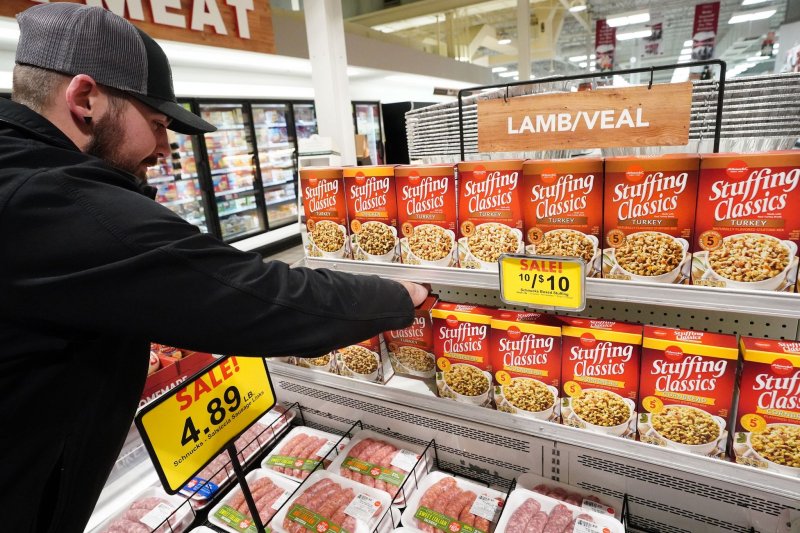1 of 3 | Anthony Larkin, meat manager of the Richmond Heights Schnucks Market, places boxes of stuffing near the turkey freezer section in Richmond Heights, Missouri on, November 15, 2022. Photo by Bill Greenblatt/UPI |
License Photo
Dec. 7 (UPI) -- Grocery bills are too expensive for the average American and customers are changing their shopping habits, according to a survey released Wednesday.
The True Cost of a Grocery Shop survey conducted by Swiftly, a retail technologies company, was given to a random pool of 1,500 participants. Results measured the habits of consumers and how they navigate inflation as it drives up grocery costs.
The survey found that more than two-thirds of consumers are struggling to afford groceries. About 83% of respondents said they rely on coupons or some form of customer rewards when they shop.
"Simply put, food costs are too high," Swiftly said in a release.
Online shopping and grocery delivery services gained some level of popularity before and throughout the early stages of the COVID-19 pandemic. The trend has not held in 2022. About one-third of consumers find themselves shopping in-store more than they did last year.
Three-quarters of respondents said they have changed their overall grocery shopping habits in the last year. This may include selecting more affordable alternatives from the shelf, searching for deals or even foregoing certain items.
The results of the survey make the economic impact of rising prices on the average consumer clear, but they also give clues to the retail industry about how to best serve shoppers.
"The grocery sector is at a turning point. After massive e-commerce growth throughout the pandemic, we are beginning to see a transition as consumer spending is tested by inflation and a looming recession," said Henry Kim, co-founder and CEO of Swiftly.
"Furthermore, the potential consolidation of giant supermarket chains could also lead to increased prices, which would be especially hard for consumers to absorb in today's challenging economy."
Kim said the findings confirms the importance of brick-and-mortar stores.
The Consumer Price Index from the Bureau of Labor Statistics has marked the continuing increase of prices across the board. Food prices have been the hardest hit category according to the latest report. While prices increased by nearly 8% on an annual basis in October, food prices rose more than 12% over last year.
Cereals, eggs, poultry and baking products are among the products that increased the most in price from September to October.
Fruit and vegetable prices decreased by nearly 1% on average.















